The Beach Boys High Times and Ebb Tides Carl Wilson Recalls 20 Years With and Without Brian By Geoffrey Himes
The following article originally appeared in Musician, Sept. 1983. Most of the text has been omitted, and just Carl's quotes have been excerpted.
... A bushy, brown beard wraps around Carl's chubby, cherubic face as he stands by the window of his house at Colorado's Caribou Ranch. The snow-capped Continental Divide looms through the window...
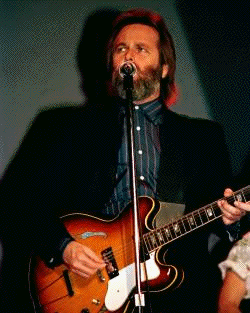 Carl
as Brian's apprentice:
Carl
as Brian's apprentice:
I've always been the one who worked real closely with Brian. I was his sounding board; I was his underling. I always tagged along. In addition to being one of the players in the studio, I worked with him in the control room, because he wanted my ear.
"Surfer Girl":
"Surfer Girl" has a real spiritual quality to it. I don't know whom he wrote it for, but there's a real heart attached to that. The chords are just so filling. For its time, the record was so advanced. It was really beautiful to be alive when that record was playing. The way our voices sounded on that, the melody Brian wrote, the way he put the arrangement together, that might be the perfect melding of all the elements. It's very enchanting; it's very Brian.
If you think back to 1961, the records then were pretty nerdy. Our stuff way very appealing: all over the country, people wanted a neat car and a girlfriend or boyfriend, people wanted to hang out at the beach. It was really an early hippie thing.
Brian created this whole world at home at his piano, and people were mad to get to California. There was an awe connected to California and the beach and the way we lived. Those were the people who were really cool. But it wasn't the real California so much as the California in Brian's songs.
Growing up and the early days:
I remember music
was always present. My dad was a part-time songwriter, and we
always had a couple of pianos in the hose and a jukebox. We had
a garage that 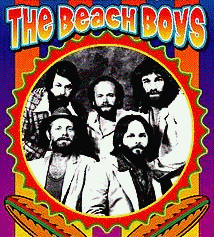 my dad
fixed up into a den. We'd all get around the piano; my mom would
play, and later Brian started to play. By age ten, he already
played great boogie-woogie piano.
my dad
fixed up into a den. We'd all get around the piano; my mom would
play, and later Brian started to play. By age ten, he already
played great boogie-woogie piano.
Brian was in love with the Four Freshmen's approach. He would play the piano for hours, really studying. As he got better at it, he'd start to do his own arrangements of their arrangements.
When I was ten, I'd have to sing a background part. The thing about that kind of modern jazz is that the parts are very strange; it's not like singing Christmas carols. I had to listen really hard; they weren't your regular three-chord tunes. If I'd make a mistake, he'd say, "No, it goes like this," and I'd have to do it again until I got it right. Just so it would be more fun, I started to learn my parts more quickly. It was great training. By the time I was fifteen, I could hear a part once and have it.
[Dennis] was the only real surfer in the group. I tried it, but I was never good, so I gave it up. Dennis was really living it; this was his life. I remember everyone was bleaching their hair; Brian tried it and it turned out a very unnatural orange - very funny. But Brian drew on Dennis' experiences. I remember Brian would drill Dennis on what was going on, really pump him for the terminology and the newest thing. Dennis was the embodiment of the group; he lived what we were singing about. If it hadn't been for Dennis, the group wouldn't have happened in the same way. I mean, we could have gotten it from magazines like everyone else did, but Dennis was out there doing it. He made it true.
Mike went to Dorsey High, and most of his classmates were black. He was the only white guy on his track team. He was really immersed in doo-wop and that music, and I think he influenced Brian to listen to it. The black artists were so much better in terms of rock records in those days that the white records sounded like put-ons.
"Surfin'":
It was my guitar,
Alan had the upright bass, and Brian played a single snare drum
with a pencil, and that was it. Brian took his shirt off and put
it over the drum  because
it was too loud. We did it all at once, with Michael on one microphone
and the rest of us on another.
because
it was too loud. We did it all at once, with Michael on one microphone
and the rest of us on another.
Dennis was so thrilled, because he was living it. He went to school and his friends said, "We were on our way home from the beach, totally exhausted from riding the waves all day. We heard your record come on, and it turned us on so much that we went back to the beach."
"Surfin' USA":
When we heard "Surfin' USA," we just knew it was going to be an undeniably big hit. It was the first time we were aware we could make a powerful record. Brian had this idea to change "Sweet Little 16" into "Surfin' USA." We were total Chuck Berry freaks, and the original Chuck Berry record is a fabulous record, but we made it our own.
My first guitar was a Kay. I would mute the strings a bit to get that clipped surf sound. I'd just hit the strings lightly with the palm of my picking hand to give it more of a percussive sound. It was a style that became popular in southern California with a lot of surf bands. Most of them were guitar bands, though, and we surfaced because we had the vocals.
I combined that surf style with a white approach to the Chuck Berry style. Our sound was very clean; we had big amps that made a clean sound, while he was just turning his amps up and cranking. I used a Stratocaster on the early records. We were young and foolish; we wanted the biggest, best, newest, most powerful thing: Fender amps, Showmans, Dual Showmans... Brian played Fender Precision bass on the early records; it was a great recording bass. Dennis was into Camco drums for a long time. the snare was good and bright and it had a full range. He used Zecos for a few years; he still has a set to record on.
Harmony:
Everyone sensed
their part. When Brian would present a song to us, we would almost
know what our part would be. Michael always sang the bottom; I
would  sing
the one above that, then would come Dennis or Alan, and then Brian
on top. We had a feeling for it. It's not widely know, but Michael
had a hand in a lot of the arrangements. he would bring out the
funkier approaches, whether to go shoo-boo-bop or bom-bom-did-di-did-did.
It makes a big difference, because it can change the whole rhythm,
the whole color and tone of it. We're big oooh-ers; we love to
oooh. It's a big, full sound, that's very pleasing to us; it opens
up the heart.
sing
the one above that, then would come Dennis or Alan, and then Brian
on top. We had a feeling for it. It's not widely know, but Michael
had a hand in a lot of the arrangements. he would bring out the
funkier approaches, whether to go shoo-boo-bop or bom-bom-did-di-did-did.
It makes a big difference, because it can change the whole rhythm,
the whole color and tone of it. We're big oooh-ers; we love to
oooh. It's a big, full sound, that's very pleasing to us; it opens
up the heart.
Alan's voice has a bright timbre to it; it really cuts. Brian's voice is very complete. He's not using it now; it's really sad. But when he does, he has a very thick voice. Our voices are voiced like horn parts, the way those R&B records made background vocals sound like a sax section. They're all within the same octave; that's really the secret to it. We didn't just duplicate parts; we used a lot of counterpoint, a lot of layered sound. Obviously, Brian's influence is now massive.
Early production:
Brian was really
the one making the records. Nick [Venet] would call out the take
numbers, but he wasn't part of making the music. When Brian said
he wouldn't work with Nick anymore, Capitol sent over this other
guy. Then it became clear to Brian, and he said, "Look, I'm
not cutting with these guys, and what's more, I'm not going to
use your studio. We'll send you the next record." Now this
was a big thing in those days, because record companies were used
to having absolute control over their artists. It was especially
nervy, because Brian was a 21 year old kid with just two albums.
It was unheard of. But what could they say? Brian made 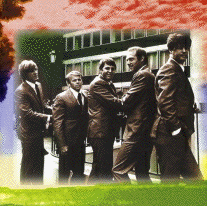 good
records. He wouldn't work at Capitol, because it was a crappy-sounding
studio. It had a fabulous string sound, and that was great for
those records that Nat King Cole made, but not for rock n' roll
guitar. So we recorded at Western Recorders, which was really
our home.
good
records. He wouldn't work at Capitol, because it was a crappy-sounding
studio. It had a fabulous string sound, and that was great for
those records that Nat King Cole made, but not for rock n' roll
guitar. So we recorded at Western Recorders, which was really
our home.
"In My Room" is a tune we've learned to appreciate more as the years go by. You can tell it's getting pretty close to home for Brian, and all those tender, vulnerable things are coming out. "California Girls" is a very artistic record for its time. The guitar part by Ray Pohlman and myself in the introduction was very different, very bizarre. You didn't expect a rock n' roll record to sound like that, classical and majestic. Then it came on like gangbusters out of nowhere.
Brian was evolving very fast. We learned as we went. He was writing stuff that really needed to be performed; that's why he needed session players.
Brian just adored Phil [Spector]; he couldn't get enough of him. Brian started going to Phil's sessions, and it just blew him away. Phil would play things back so loud it was scary. I think the psychological and emotional impact of going in and hearing songs before they came out made him totally fascinated with Phil, under a spell almost. That was Brian's kind of rock; he liked it more than the early Beatles stuff.
When Brian first heard a record, he would get the whole thing at once. The rest of us would have to listen ten times or so to really get everything that was going on. So when Brian taught us our parts, he had the total picture in his head.
I remember a date at Gold Star one night. There were a lot of players in the room. They were making a big, big sound, and Brian said, "Whoa!" because one little thing didn't happen; someone didn't ring an orchestra bell at the right time. He used to drive Michael crazy. Michael would be doing his lead, and Brian would say, "Okay, scratch." We'd say, "No, Brian, wait a minute, we love that part." And he'd say, "Nope, 86," and it'd be gone; we'd have to do it again. But he was always right.
Brian's 1964 breakdown:
This guy had turned Brian on to LSD, and Brian just wasn't set up for it; he couldn't handle it. The pressure of writing, producing and performing all had a cumulative effect on him. Earlier that year, the group had decided they didn't want to work with my dad anymore. There was some fatherhood he wasn't willing to let go of. It's hard to have someone bossing you around and working for you too. All these pressures and the chemicals took Brian apart. He flew home, and it was decided he couldn't go on the road.
We had the choice of continuing or not continuing. We just felt, "This is too much fun to stop." It got the group to discipline itself and to really do good work on the road. I just assumed leadership; it seemed natural. It got down to the point where I knew it would get done if I did it. It was kind of a private directive from Brian, too. I'd always been Brian's apprentice. That's really when I became the older brother.
Summer Days And Summer Nights was a turning point; that album sticks out. Brian was really getting into a very expansive stream of energy. We could see that he was opening up and making very serious music, and it was serious rock n' roll music which made it complete.
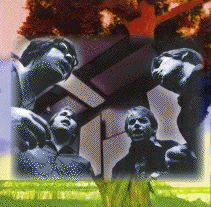 Pet
Sounds:
Pet
Sounds:
The disappointment and the loss of innocence that everyone has to go through when they grow up and find everything's not Hollywood are the recurrent themes of that album. Pet Sounds was really Brian's baby; he did an awful lot of the singing on it. Singles weren't enough for him anymore. He wasn't getting enough out of the experience. Most of the albums at that time had a hit and eleven other tunes. He was really the first to make albums as a whole. Pet Sounds was far more adult and human than what he had done. The whole album was integrated with this really high quality music recorded beautifully with all this big production. Pet Sounds had rhythm and power in it, and yet the chords and constructions were starting to get classical.
The idea for Pet Sounds was Brian's; it would be his favorite sounds; his pet sounds. He was fascinated by sounds and collected them. He would experiment with tapes: we'd laugh in key and try different things just to see what we could do. It's that old thing of going maybe too far to find out what you can do, and then pulling back a little bit to fit what else you're actually doing.
Capitol didn't support Pet Sounds; I think they tried to talk Brian out of having it. Can you imagine that album not coming into being? It was a glorious album in our ears, but then, but the record company gave it a real lukewarm reception. That really worried Brian; it really bothered him. He'd put his heart and soul on the line.
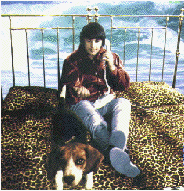 "Good
Vibrations":
"Good
Vibrations":
"Good Vibrations" has a lot of texture on it, because we did so many overdubs. We'd double or triple or quadruple the exact same part, so it would sound like 20 voices. When I first heard it, it was a much rougher sound; it had more whomp to it. Instead of making it bigger, bulgier and more raucous as Phil Spector might have, Brian refined it, and got it more even-sounding. He had the idea of "I'm picking up good vibrations," but Michael didn't write the lyrics until the very last minute.
We recorded different sections at three different studios. Each one had a good sound for a different thing. Recording in sections was an innovation. It was pretty daring back then to record a section and see if it would fit in later.
Smile:
Brian just couldn't thread it together, he couldn't make that full cycle and tie it all together. How finished was it? Half, I suppose. At that time, it just seemed inconceivable to spend two years on an album. Just think: two years before, they wanted three albums a year. If people heard the Smile tapes today, they'd hear a lot of themes that keep cycling back on each other. A lot of tunes were interchangeable; you could take a section out of one and put it in another.
To get that album out, someone would have needed willingness and perseverance to corral all of us. Everybody was so loaded on pot and hash all of the time that it's no wonder the project didn't get done. Brian was getting fragmented, starting to have difficulty completing things. And it was also a thing of, "What if it didn't turn out to be great, what if it had totally flopped?" That would have completely destroyed him. We would have lost him forever in terms of having any communication with him.
In the middle of all this, Brian just said, "I can't do this. We're going to make a homespun version of it instead. We're just going to take it easy. I'll get in the pool and sing. Or let's go in the gym and do our parts." That was Smiley Smile. I've always said that Smiley Smile was the bunt, and Smile was the home run. A lot of Smile songs were on Smiley Smile but they didn't sound the same at all. The melodies were similar, but the versions were more laid back. Maybe we'd do the melody, but nothing would be there of the original production. Brian had given up and didn't want to know about it. So we just had fun.
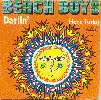 Wild
Honey:
Wild
Honey:
Wild Honey was underrated. It didn't have the polish and pizzazz, but it brought out all our R&B influences that had always been there but people had overlooked.
The late '60s:
We were used as a reference point as to what was lame about the time. It was nonsense, but people still associated us with cars and surfboards. When the hits stopped coming, we all felt a lot of pressure. It was back to the real world after the fairy tale. Carl leans back in his chair and sighs. That was a scary time for us. We were trying to get free from Capitol, because we didn't think they supported the group anymore. We were really stuck. Mo Ostin had always dug the group, so we finally signed with Warner Brothers. It was called "Mo's folly,' because people at the label thought we were ridiculous. But Mo was incredible, he really supported us when we needed it.
Sunflower:
We did Sunflower, which we thought was one of our really good records, but that didn't hit either. It was a great time for Dennis, he was at the very height of his creativity, and it got stifled later. He wrote "Got To Know The Woman" and "Slip On Through"; damn, I wish he would do that again.
Carl & The Passions - So Tough:
Even without the Pet Sounds reissue, I thought that Carl & The Passions should have been three separate albums. I wish that Brian had been strong enough to produce the record, because it could have been an ass-kicking, great record, but...
Brian was starting to get into the drug stuff then, some really bizarre behavior. We didn't know what was going on. It didn't even occur to us that he was strung out on coke. We were really sheltered. We were dumb.
Endless Summer, etc.:
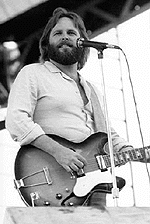 We
just surrendered to it. We'd gone through so many changes over
the idea of oldies over the years, and now it was obvious what
the people wanted us to play. Really obvious.
We
just surrendered to it. We'd gone through so many changes over
the idea of oldies over the years, and now it was obvious what
the people wanted us to play. Really obvious.
Brian Is Back - 15 Big Ones:
That slogan was simply premature. Brian was almost there, but not quite. Once we had finished a certain batch of songs, Brian said, "That's it; put it out." That's why the album sounds unfinished. Brian just wanted to do one cut and capture the moment rather than working on something.
The Beach Boys Love You:
Brian was just getting back on his feet. He had been with Gene [Landy] for more than a year. He was becoming a lot more productive. It was part of his therapy to make music. But Gene and Stan Love [Mike's brother and the group's business manager] disagreed a lot about what Brian should do. Gene was doing it form a theraputic angle, and Steve had business considerations. So Steve terminated Gene. It was really a shame, because Brian regressed pretty much after that.
The group was really fractured at that time. We really went through an explosion. A lot of stuff that hadn't been acknowledged and hadn't been dealt with surfaced.
1977's near-breakup:
That was a very
rough time for all of us. Relations were very strained and icy.
Everyone was frightened and it came out as anger. Everything was
falling apart in 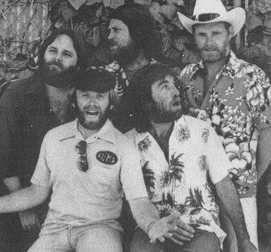 front
of us, and we didn't know how to get ahold of it. What we had
to do was just let everything fall apart and then realize, "Now,
wait a minute. Do I want to fight with my family and friends?"
We got a chance to see if we really wanted to be a group or not.
We got to choose again. It became clear that we should put it
back together.
front
of us, and we didn't know how to get ahold of it. What we had
to do was just let everything fall apart and then realize, "Now,
wait a minute. Do I want to fight with my family and friends?"
We got a chance to see if we really wanted to be a group or not.
We got to choose again. It became clear that we should put it
back together.
Keepin' The Summer Alive:
Brian got hot for about three days in the studio. He was singing like a bird. All the protection that he usually runs just dropped; he came out of himself. He was right there in the room. Michael got so exited that he was singing several notes above his normal range.
Carl going solo:
I was never inclined to do a solo album until three years ago. I got to the point where I wanted to sing and make new music; the guys in the band decided not to record and we were playing the same old songs every night. I got itchy. I remember the last two weeks of the summer tour of '79, I was so bored I couldn't believe it. It was horrible to go on sometimes, because there was nothing in it. It was the first time that had ever happened to me with the group.
I asked Jerry Schilling [Carl's personal manager] if his wife Myrna might like to write some tunes with me. [Myrna had been one of the Sweet Temptations]. So I took a cassette player, a guitar and a tiny amp over to their house, and we just started making up tunes. It was very easy and natural. She has a very pure sense - very gentle and yet funky.
I didn't want to compromise, and make my stuff sound like the Beach Boys, just as I wouldn't want to compromise the Beach Boys' stuff either. The R&B approach just came naturally. It's the side of me that's always wanted to come out. I have this massive collection of R&B records. When we were doing Pet Sounds, I'd go home and put on my Stax and Aretha stuff. It's always been a big part of my life.
As for playing with the Beach Boys, Carl agreed to do some dates with the band in April of 1982, but again the lack of formal rehearsal time irked him:
Everything was
rushed; it was very mechanical. There was resistance to rehearsing
 out of habit. But
it all finally came together at the last minute. In 1983 they'll
be a lot more rehearsals, new faces, new songs... I may open some
shows with my new band.
out of habit. But
it all finally came together at the last minute. In 1983 they'll
be a lot more rehearsals, new faces, new songs... I may open some
shows with my new band.
I'd like to see the group take another shot at making one more good record. That's the thing we keep trying to do but can never quite pull together all the elements. But I don't think we'll make another Beach Boys album until Brian's healthy enough to produce again. I know we could make a real strong commercial record with an outside producer. So that's possible, but, if you're talking about making a great record, "Good Vibrations" class, you're talking about Brian with us. Anything else it bullshit.
And yet, I don't mind if he doesn't make any more music. That's fine with me. I don't care if he makes hits or not. My interest in Brian is that I love him as a human being and as a brother, as I love all my family. I want him to have some joy and satisfaction in life, and he's not getting that. I'm not discouraging him by any means, but the main thing is that he have a nurturing, loving life. That's all that matters anyway.